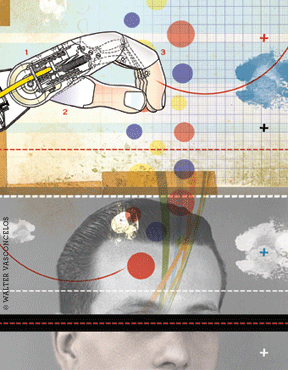
“How many of you would be willing to chop off your arm?” Amy Gutmann asked a room full of undergraduates in April.
Penn’s president was making a rare turn as a substitute teacher, of sorts, taking Professor Jonathan Moreno’s usual place at the front of his bioethics course. A student had just voiced unease over the prospect of prosthetic limbs becoming functional enough to appeal not just to amputees, but to able-bodied people looking to upgrade from mere bone and muscle.
That’s just the kind of hypothetical that bioethicists tend to dwell on in classroom debates. Moreno, a David and Lyn Silfen University Professor in the history and sociology of science, had been doing it all semester. Where should society draw the line between therapy and enhancement? If technology offers a way to transcend our limitations, what, if anything, should stand in the way of extraordinary people from trying to become even more excellent?
Gutmann’s parry was part Socratic dialogue, and part preview of what Barack Obama can expect from his new Presidential Commission for the Study of Bioethical Issues, which he named her to chair last November [“Gazetteer,” Jan|Feb].
“What you’re absolutely right about,” Gutmann continued in her reply, “is that how we think about what constitutes natural and not is extremely challenging.” That’s a philosophical question that the last presidential bioethics council spent a lot of time thinking about, she added. But Gutmann gave the impression that her priorities will be somewhat different.
“In the university, it’s perfectly okay to take the most intellectually challenging, most esoteric question,” she remarked. “Philosophers are very good at picking an extreme example that’s very challenging, and, you know, struggling with it … to clarify something. But we have to be very careful not to ignore [other] issues that are very high-stakes, and have big payoffs if you get them right.”
In other words, Gutmann’s bioethical interests seem to reside less in mind-bending scenarios like bionic limbs than in policy quandaries like health-care access and medical-investment priorities.
A question from another student brought that out. “I think all these issues [like enhancement] are so cool and so interesting,” a young woman began, “but I often feel that other really important bioethical issues … like using our resources to save African children from malaria, are often ignored. And I was wondering if the commission will address issues like that.”
That was all the spurring Gutmann required. “I happen to agree that it’s important when you think about the ethics and social responsibility of medicine, technology, and science, that you consider how many lives that stand to be improved or lost by what you’re doing,” she replied. Then she circled back to the quest for bionic arms, framing the tension between therapy and augmentation a little differently this time.
“Just take veterans who lose limbs. [They] could live more normal lives [by regaining the complete] use of their limbs. And that has a big upside,” Gutmann noted. “But an investment in that is an investment in science that’s yet to be perfected, whereas we have the means now to save lives in certain public-health domains, and we’re simply not doing it. I say ‘simply’ not doing it—there are political and moral and practical reasons why we’re not doing it, but there are a lot of issues that come up.”
Gutmann quickly segued to another bioethics issue seen through a policy prism. “For example, a lot of drug testing now goes abroad,” she observed. “If you do clinical trials for a new drug in, say, a developing country in Africa, and it turns out that through clinical trials you find out that this drug is really effective—and yet that country doesn’t have the economic means to afford it—is it moral simply to take the findings from those clinical trials and have them benefit citizens who can afford it, and a country that can afford it, the United States, and just leave that country’s population without access to that drug?
“It sounds like a rhetorical question because our impulse—certainly my impulse—is to say no,” she continued. “But if it is no, then you have to ask the next question: Okay, how, practically speaking, can you make it affordable for drug companies to do that kind of testing?
“I think there are answers to it, but again you can see how it becomes an ethical problem.”
Then the discussion turned to the high cost of end-of-life care in the United States, and more Socratic dialogue about whether Americans are getting more or less bang for their healthcare buck than other developed nations. It wasn’t quite a rehearsal for her commission’s inaugural meeting, but in terms of both substance and style, Gutmann struck a different tone from her Bush-appointed predecessor, Leon Kass, who courted controversy with his outspoken opposition to biotechnology advances like embryonic stem-cell research. She seems less inclined to stake out positions as a public intellectual than to serve as a well-informed moderator.
“I think the students were really into it,” Moreno said a couple weeks later, after taking his class’s temperature. “They were riveted. They were impressed that she was thinking about global-health stuff, sort of out-of-the-box of just the high-tech issues—which are not the only issues in bioethics. I think she also impressed on them that she has an open mind.”
Moreno, for his part, was impressed with his substitute’s performance at the lectern. He hopes to invite her again next year, when the commission will have amassed a body of work students can analyze. This time around, he was pleased with the questions they posed—and the fact that
Gutmann’s responses kept them in their seats past the time their backpacks usually start rustling.
“What impressed me most is they didn’t walk out at ten till two,” he laughed. “As they would have with me.”
—T.P.




